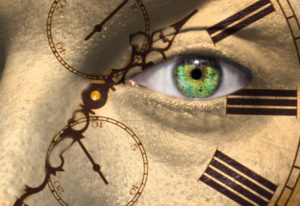While most people are well aware of how aging affects the various functions of the body, its effects on sleep patterns and the circadian rhythm have not been as well understood until more recently. Increasing amounts of research now demonstrate how the body’s natural circadian rhythm can be disrupted because of poor eye health. To understand how the aging of eyes disrupts the circadian rhythm, you need to understand the relationship between all of these body functions and resulting health issues.
How the Eye Changes as it Ages
Even your eyes are not immune to deterioration as you age. There are a number of changes that your eyes go through as you grow older including the following:
Age-related Eye Diseases

Yellowing or Browning of the Eye
Years of exposure to elements such as wind, ultraviolet light and environmental impurities such as dust can cause the eyes to begin to yellow or turn brown as these effects build up.
Conjunctiva Thinning
The conjunctiva is a layer of tissue that lines the eye and the eyelids. As you grow older, this protective lining begins to grow thinner, allowing more foreign materials and infection to enter the eyes.
Increased Transparency of Sclera
Like the conjunctiva, the sclera serves as a protective barrier while providing the eye with structure and rigidity. As it becomes more transparent with age, some people notice a bluish hue in the eye.
Circadian Rhythms Defined
To understand how your eye health affects your sleep patterns, you first need to understand the function of the circadian rhythm. This internal 24-hour biological clock dictates the sleep-wake cycle as well as various other daily rhythms.
This cyclical rhythm and the associated release of hormones wake the body in the morning and keep it alert throughout the day. At the same time, the hormone cortisol is at its highest levels during the day in order to provide energy. At night, the body then begins to naturally release the sleep hormone known as melatonin, which is suppressed during the high-functioning daytime hours. When the circadian rhythm reaches a low point at night through the timed release of melatonin, the body is more prepared to rest and repair. This cycle of repair is crucial to your overall health.
The circadian rhythm depends on the presence of light to function at maximum levels. The eyes play an important role in processing light and transmitting it to the areas of the brain that control the circadian rhythms.
Research has demonstrated that people with disrupted circadian rhythms are not able to get sufficient rest. This lack of quality sleep puts them at risk for a number of health issues. People who are particularly susceptible to circadian rhythm disruptions are shift workers who work at night and sleep during the day.
How the Aging of Eyes Disrupts Circadian Rhythm
As the body begins to age, the lens of the eye starts to yellow and the pupil narrows. This happens because the muscles that control the size of the pupil and its reaction to light gradually lose strength. As a result, the pupil becomes smaller and less responsive to changes in the lighting around you.
Because of these changes, the eyes become less effective in their ability to absorb light. This is particularly true of blue light. It is this part of the light spectrum that directly relates to the body’s ability to regulate the circadian rhythm.
How a Disrupted Circadian Rhythm Affects Overall Health

Aging is a natural part of life. While you cannot completely stop the aging process, there are steps that you can take to slow down the deterioration of the body so that you can enjoy a more fulfilling and healthy life.
Taking care of your eyes by nourishing the body with vitamins A, C and E and getting regular eye exams are just a few of the ways that you can help to protect your eyes and support good health. The benefits of taking care of your eyes will extend to the regulation of your circadian rhythm and your overall sleeping patterns.







